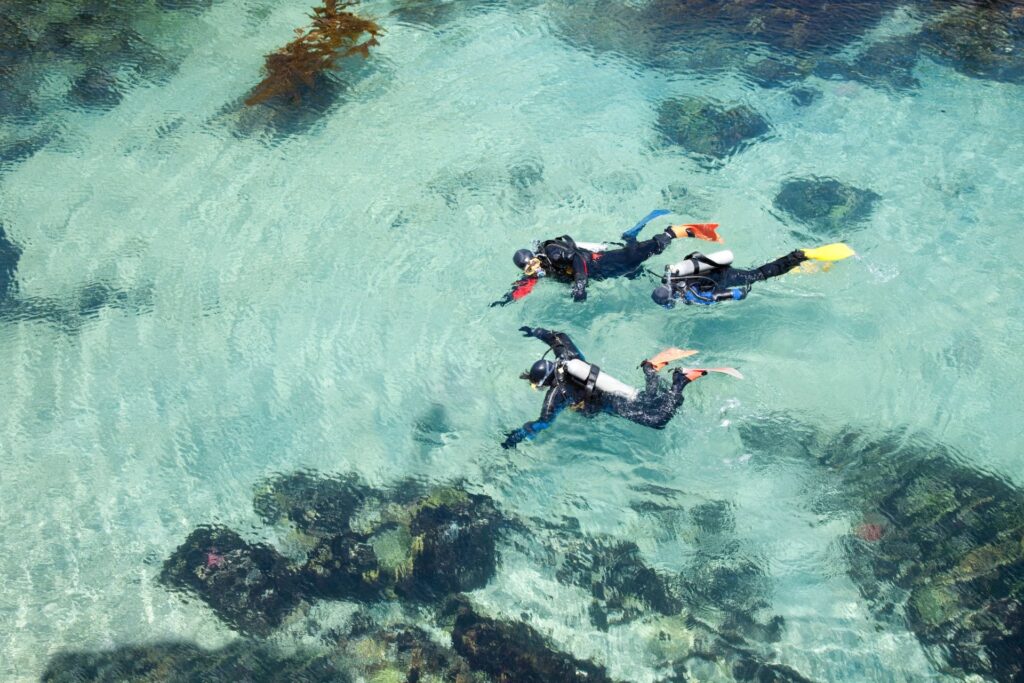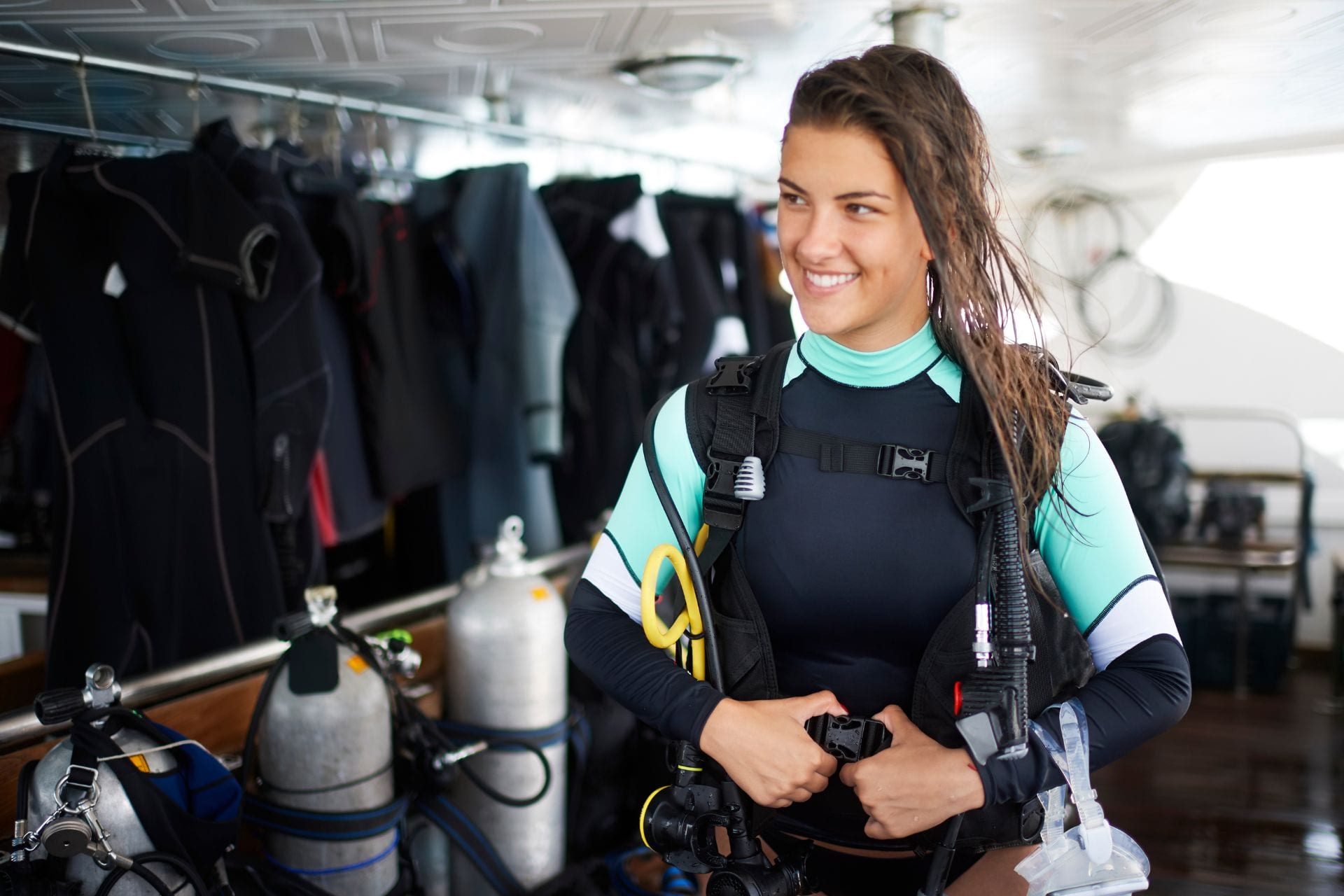Love the idea of trying scuba diving? Contrary to popular belief, you can’t just rock up at a dive shop and expect to go out in the open water.
You have to become scuba diving certified and complete a training course with a recognized scuba diving agency.
There are hundreds of training agencies around the world, but PADI and NAUI are the most prestigious organizations. But the question is, which is better?
In this guide, we’ll look at NAUI vs. PADI and help you decide which is the right scuba diving agency for you.
Interested in becoming a dive master? Read our next guide to discover how to turn your passion for scuba diving into a career as an instructor.
What Are NAUI and PADI?
If you’re totally new to scuba diving, you might be wondering what NAUI and PADI are.
What is NAUI?
The National Association of Underwater Instructors (NAUI for short) is the oldest non-profit scuba diving certification organization in the US. It’s been around since the 60s, and the organization offers diving courses for beginners right through to experienced divers.
What is PADI?
The Professional Association of Diving Instructors (PADI for short) is the largest dive certification organization in the world. Although it’s not quite as old as the NAUI, it’s the most-used organization, offering a range of scuba diving courses around the world. More than half of trained scuba divers in the world get their certification through PADI.
Scuba Diving Certification: What is required?

In order to complete a beginner’s scuba diving certification, you must be at least ten years old, able to swim, and in good physical health.
Some countries require a health check with a physician, but you’ll be able to check if this is needed with the organization you decide to go with.
These are the only requirements, though. If you meet these criteria, you can take an open water diving course that will teach you to scuba dive safely in the ocean.
If you’re looking to do advanced courses, there will be more requirements, but since this is a beginner’s guide, we’ll focus on the open water courses provided by both organizations.
Course Offerings: What Do They Include?
There are only small differences between the NAUI and PADI courses, and both are excellent options for getting your scuba certification. Both are globally recognized, and it’s easy to switch between the two diving agencies if you want to get certified at a higher level in the future.
Business Structure
PADI is a for-profit business, while NAUI is a non-profit organization. This is one of the key differences between the two agencies.
Prices vary depending on where you are in the world, but you’ll usually find that a PADI course is slightly more expensive compared to a similar NAUI course.
Types of Certifications
Both agencies offer a full range of scuba diving courses, including introductory diving, open-water diving, and free diving.
Once you’ve got your basic training, you can also take advanced courses, like the PADI wreck diver course.
However, you’ll find that they have slightly different names depending on which agency you use. For example, the Open Water course at PADI is the Open Water SCUBA Diver course at NAUI. Even so, the practicalities of the courses are very similar.
Life-Saving Skills
At NAUI, you’re required to take basic life-saving training, which shows you how to save an unconscious diver. However, PADI doesn’t require this as part of its certification.
The NAUI also requires you to do a skin dive, while PADI does not. Skin diving involves diving without a wet suit or tank – which comes in handy during emergency situations.
Because of these additional life-saving skills, NAUI is used by the US Navy for training purposes. Of course, if you’re planning on diving recreationally, you’ll have a trained NAUI or PADI instructor who will be there to help in emergency situations.
Timeline
If you take a PADI course, you get scuba certified as soon as you complete the program. However, you won’t be certified with the NAUI until you’ve completed all the skills and your NAUI instructor is satisfied that you are ready for open water.
This means you’ll need a decent level of confidence in front of the instructor rather than just proficiency in the list of skills required.
Course Content
As you can see, there are subtle differences between the two agencies, but they do both include all the vital skills you’ll need to dive safely, including:
- Theoretical learning of scuba diving principles and terminology.
- Practice using scuba gear in a pool (or pool-like environment).
- Four logged dives in open water to practice your diving skills.
NAUI vs PADI: Pros & Cons

It’s hard to talk about the pros and cons of each agency since they are so similar. However, there are a few things to consider when you’re deciding which one to go for.
Location
Both the NAUI and PADI have dive schools all over the world. However, you will find more PADI schools. If you plan on getting your open water certification while you’re on vacation, do some research to see which courses are available in the area you’re traveling to.
Potential Career
If you are passionate about scuba diving and want to turn it into a career, there are far more PADI jobs worldwide simply due to the sheer number of centers and affiliated shops.
Although both are recognized certifications, you’ll probably find it easier to get an instructor role with a PADI certification.
Price
As we said before, the price of scuba diving courses varies hugely around the world. Both PADI and NAUI courses are more expensive in the US, and both are cheapest in Thailand.
If you’re on a budget, you’ll have to look up the local dive schools in your area and price compare. You might find a significant difference between the price of your local NAUI and PADI courses.
FAQs
Does PADI recognize NAUI?
Yes, your certification will crossover between the two major agencies. However, you may have to take a refresher course if it’s been a while since you were certified and you want to take a higher-level certification at a different training agency.
Do NAUI certifications expire?
C-cards (what you receive when you pass your scuba diving course) don’t expire, and you’ll have them for life. However, you may have to prove that you’ve dived recently at some dive centers if you’re looking to become an instructor. If you haven’t dived recently and you want to go on a trip, it is recommended that you take a refresher course to brush up on your safety knowledge.
Is NAUI accepted worldwide?
Yes, NAUI certification is accepted worldwide as a gold standard in scuba diving. Anywhere that accepts PADI certification will also accept NAUI.
Can you switch from PADI to NAUI?
Yes, if you have a beginner’s certification in PADI and want to switch to NAUI, you can. However, you may be required to take a refresher course or prove you still have your basic knowledge. It’s very rare you’ll have to start from scratch at the new agency, though.
How deep can you dive with NAUI?
During diving training with the NAUI, students can dive to a maximum of 130 feet (40 meters). You’ll get to go on a minimum of six open water dives, including three separate dives to learn about navigation, low visibility diving, and deep diving.
NAUI vs. PADI: Which is Better?
When it comes down to which is better, NAUI or PADI, either one is great. They’re both recognized certification centers with schools all over the world.
If you’re a practical, open-water diver that is interested in safety training, NAUI is probably a better option. However, if you’re hoping to travel and do recreational diving around the world, PADI will work great.
Either way, you’ll finish your course as a confident, certified scuba diver!

